Reading Time: 9 minutes
It was great to be at the UK MoodleMoot in Edinburgh this week. It has become an annual highlight for me as a place to meet old and new friends alike, to share some of the things we’ve been working on and to learn from the vast experiences of the Moodle community around the UK and wider afield. The event ran over four days but myself and Andrew Downes went up for the two conference days, along with a whopping 400 delegates from 29 countries.
Epic sponsors the Moot for the first time
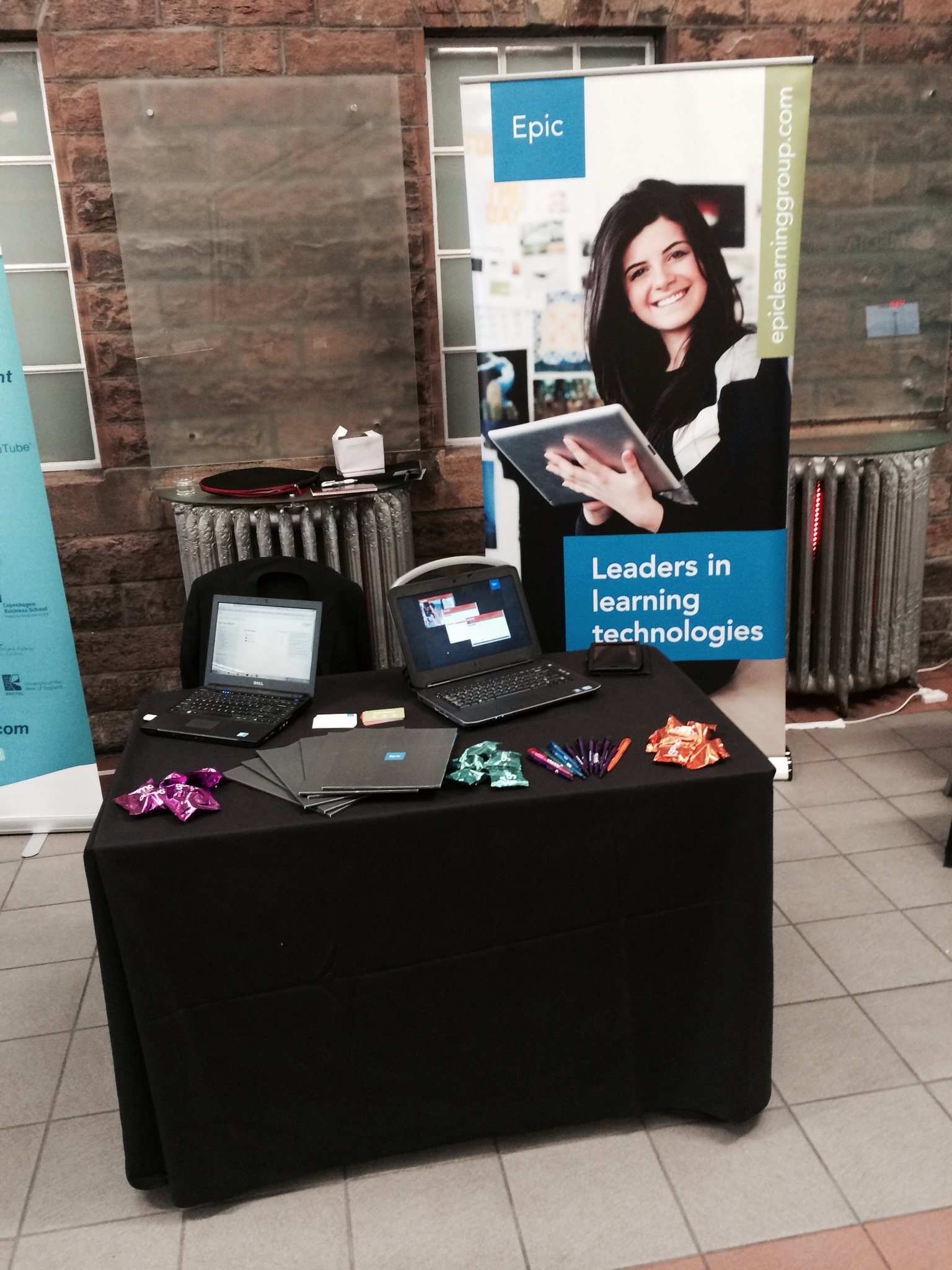
After presenting for the past two years, Epic was a sponsor of the Moot for the first time this year. As a Silver sponsor this meant we paid a fee which went towards the running of the event, in return for a stand in the exhibition area and exposure in the event publicity material and banners. MoodleMoot is an important fixture in the UK learning technologies calendar and we have gained so much in the past from the knowledge sharing and networking, so it was a great opportunity to give something back financially, rather than just limiting our involvement to one or two presentations, important as that is. Andrew and I tried to balance a mix of stand duties during breaks and lunch with attending as many sessions as possible, so if you chanced upon an empty stand at some point then apologies, but judging by the number of business cards taken away we are sure to be speaking to many of you soon!
Talking about mobile learning with Moodle
I submitted two presentations ahead of the event and both were accepted. The Moot Gods were kind to me and scheduled both sessions for the morning of Day 1, which meant I didn’t have to spend valuable Moot time worrying or preparing, or have to present with a thumping hangover on day two (which has been known).
My first presentation was Using mobiles to support active learning with Moodle. Active learning was one of the conference themes, and I focused on using native mobile device features like taking photos, audio and video and submitting or sharing these into Moodle using assignment, forum and database activities.
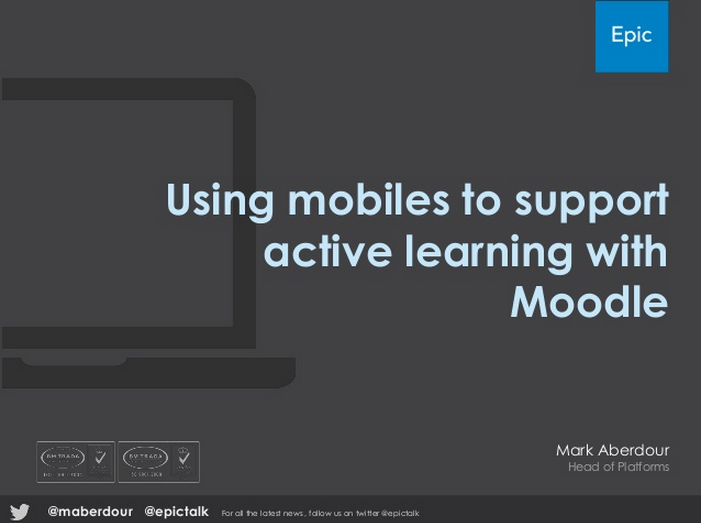
Click the image to open the presentation on Slideshare.
I extended this theme further with my next presentation, 20 ideas for mobile learning in Moodle. This was a “pecha kucha” presentation, comprising twenty slides of twenty seconds each. The slides auto-continue, so the pressure is high to keep on track and on time! Spectacular failures in this quick-fire format are commonplace, so I was glad to get through it unscatched.
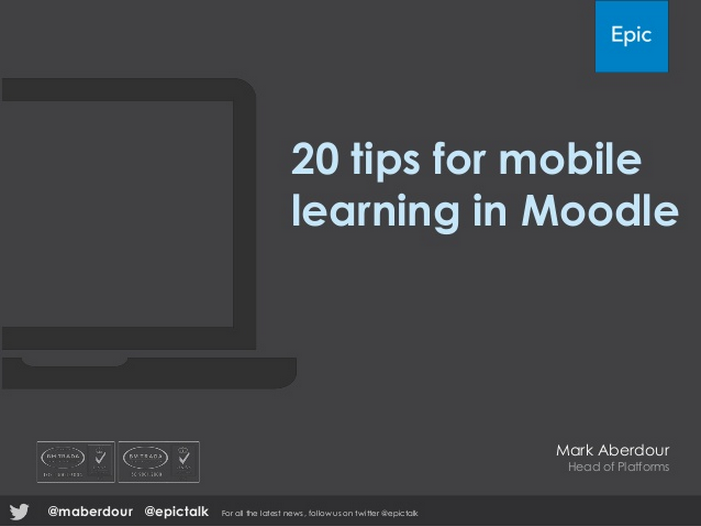
Click the image to open the presentation on Slideshare.
Later in the day I also sat on a mobile learning panel with Moodle founder Martin Dougiamas and Bootstrap theme developer Bas Brands. We had a one hour discussion session which went remarkably quickly and fielded a range of questions from developer to practitioner topics. Not being a developer myself, I had to defer to Bas and Martin on the techie stuff, but was hopefully able to add some useful insights from the practitioner angle. The most interesting discussion points were around how to improve the Moodle navigation experience on mobiles (in particular, what should we do with blocks), which Epic has experimented with quite a lot, and how Moodle can support mobile users in developing countries. Epic opened an office in Brazil in 2011 and our customers are mobile crazy over there, skipping the legacy desktop infrastructure that we have to contend with in the developed world and delivering elearning straight to mobile instead. The idea of text-only Moodle was discussed for less developed parts of the world, opening up vital education opportunities where feature-phone use dominates. An interesting session and some good conversations afterwards.
More mobile goodness
Mobile Moodle was a common topic of the conference, with Moodle creating a great mobile experience since version 2.5 when the Bootstrap theme plugin made it into the standard Moodle release under the guise of the Clean theme.
Stuart Lamour and Paolo Oprandi from Sussex University did an insightful session on mobile learning for students and tutors using a live demo of their Moodle site. This site still runs on 1.9 but has been very influential as a testing ground for many of the responsive ideas that made it into the Bootstrap and Clean themes through Stuart’s ongoing involvement in those projects. I like how they do presentations as Moodle courses too, but unfortunately this means there is no Slideshare afterwards!
Part of the attraction of the Moot is the networking and sharing, and I had two really nice moments of sharing after my presentations. One delegate shared a very nifty tip with me, involving exporting Book activities into epub format using a tool called Lucidor, which includes all embedded images and video as well. Once in epub format the publication can be downloaded to Kindle devices and ereaders. It’s a really neat tool and a great way to convert activities for mobile usage.
Another delegate was interested in the Google research that I had quoted, the New Multi Screen World. Google had measured average user time per device and established rules of thumb that smartphone users interact for 15m and tablet users for 30 mins during a single device session, and I had suggested that this should inform our learning design for mobile devices. He posed the question as to how device mirroring will change this, so if a smartphone was mirrored onto a larger tablet, or even a TV, would the interaction time go up accordingly? Sounds like one to watch.
Interestingly, there wasn’t much usage among the delegates of the native mobile app. We did a show of hands in the mobile panel session and while many delegates were using the mobile themes, hardly any were using the mobile app itself. This may be because it doesn’t support enough use cases yet. It does capture of photos and video, for example, and will synch these into Moodle once connected, but won’t download course resources, which I think is what many people are waiting for. The project needs more developers, so if this stuff floats your boat, please get involved.
Improving Moodle’s user experience
The other big theme of the Moot this year was around improving user experience. A standout session was by Alex Walker from Glasgow City College about Timeline: our Moodle integrated social network. Glasgow City College have reworked their My Moodle page into a Facebook-like ‘timeline’ experience Alex presented last year on the user experience improvements they were doing back then, and clearly their site has gone from strength to strength in the intervening twelve months. The new design made for a greatly improved user experience with a lot of thought going into what is being presented on the My Moodle page and using activity streams to surface recent actions. It was all about putting the learning experience first.
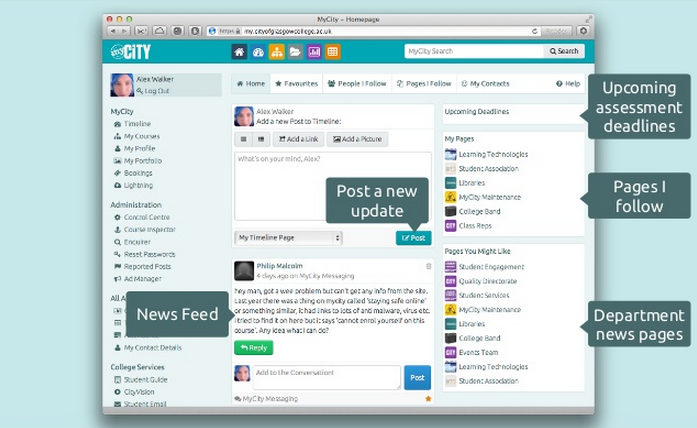
Click the image to open the presentation on Slideshare.
Alex did a second presentation on the course format that they have developed at City College too. Again, a lot of thought has gone into make life easy for the learner and the result is a great looking course page.
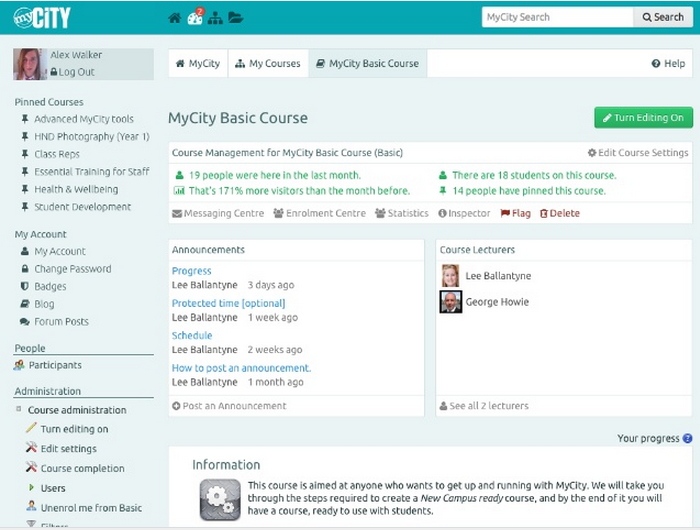
Click the image to open the presentation on Slideshare.
Stuart Lamour gave a good demonstration of his recent work at Moodlerooms in making the Moodle forums accessible. They engaged with the RNIB for user testing and the resulting experience was not only accessible but a huge improvement to the user experience all-round. Stuart also featured in a panel discussion alongside Martin Dougiamas and Paolo Oprandi from Sussex University, discussing usability in Moodle. This was a really interesting session with good audience participation.
User experience seemed to be on everyone’s lips this year. Great progress has been made in this area though recent Moodle releases and it really seems to be building up a head of steam now. Continued community engagement around this topic will really help drive it forward for future releases too.
End of the 1st day of #mootuk14, my distinct impression is that this is the year of Mobile, Bootstrap and user-lead UX design for #Moodle
— Martin Hathaway (@martinhathaway) April 15, 2014
//platform.twitter.com/widgets.jsOther standout sessions
There was a great pecha kucha by Rebecca Barrington about the Checklist plugin and some debate over the pros and cons of this versus the Progress Bar plugin. Checklist certainly looks very versatile and is one I’ll be giving a closer look. Anne Jamie from Edinburgh Napier gave a really interesting session on using the Book module. They were using it as an individual reflective log through some clever use of permissions and groups. It was a really creative use of an activity normally just used for presentational purposes, and it served as a great example of just how you can make things work in so many ways through activity configuration. Well done Napier!
Superb to hear @moodler compliment Napier presenters for using Moodle how he always dreamed it would be used #mootuk14 — Digital Maverick (@digitalmaverick) April 15, 2014
//platform.twitter.com/widgets.jsAnother standout session came from the RAF. They are currently going through a major Moodle upgrade cycle and increasing their audience from 50,000 to 300,000 users. It was interesting hearing about the trials and tribulations of using Moodle in defence, and great to have the forces represented at the Moot. I went to an MOD Moodle symposium a few years back at HMS Sultan in Gosport, which was to a closed audience of forces and suppliers, and it was evident then that Moodle was in widespread use across the Army, Navy and RAF in the UK. So it was really good to see the RAF out and about, engaging with the wider Moodle community. Hopefully this more open engagement is a sign of things to come.
The keynote from Martin Dougiamas (@moodler) on Day One was about the future of Moodle. This future clearly revolves around teachers – Martin was keen to point out that by ‘teachers’ he was referring to anyone using Moodle to educate people, be they from schools, universities or the corporate world. In his words, Moodle will not be lining up to join the new generation of automated learning tools. Moodle has always been a tool that allows teachers to support their learners, and the future of Moodle will works towards making it even better in this respect.
The other standout “session”, of course, was the gala dinner. Thanks to Elearn Design for sponsoring the dinner and to Gavin and the team for the food and wine selection. It was absolutely gorgeous and the venue (and backdrop) was just amazing.

//platform.twitter.com/widgets.jsParting thoughts
This was my third MoodleMoot and the best yet. The Corn Exchange venue was not as good as the Dublin hotel used the past two years as some conference rooms were a bit tricky to get to, but it was still a good venue and the staff were just great. The organisation from Gavin Henrick and his team was once again faultless and Gavin was a brilliant event host, facilitator and connector. Edinburgh is a superb location and it was a pleasure to visit the city again after a break of about ten years for me.
The community aspect is one of the reasons I enjoy working with Moodle so much, and the 400 delegates were friendly and welcoming to all involved. One of the key takeaways on the community side was the amount of women at the conference, both as delegates and speakers. Many open source and technical communities are criticised for their lack of, or treatment of, women but the Moodle community is one that can be held up as an example of how to do it right. By my reckoning about 40% of the conference sessions were led by women, and when you look at some of the open source speaker stats on the Geek Feminism wiki, you can see how far the Moodle community is ahead of the rest of the open source world.
I was uplifted not only by the proportion of women as delegates at #mootuk14 bt also by the no that presented & the no considered as EXPERTS — Digital Maverick (@digitalmaverick) April 17, 2014
//platform.twitter.com/widgets.js
Finally, MoodleMoot has renewed my drive and enthusiasm for all things Moodle. I attended the event with my colleague Andrew Downes. Immediately after the event, Andrew’s desire to get more involved in the Moodle community was evident as he was enthusing about how he might contribute more. This was really great to see coming from someone else, because that’s exactly what the Moot does for me too. You come away from this event with a renewed drive and more enthusiasm than ever to get even more involved. Moot is just a short, physical manifestation of the amazing thing that is the Moodle Community. Seeing the community come together, for a few days to share knowledge, generate ideas and form new connections is just awe inspiring. It’s what makes Moodle – and open source – great. Long may it continue.
Thanks for the writeup Mark. It’s given me some things to look into, and also made me rethink my attitude to Moodlemoot, which I’ve always seen as very “education” focussed.
It’s interesting seeing Martin’s point about Moodle being for teachers. He’s exactly right. In a good teacher’s hands Moodle is a brilliant tool.
I enjoyed reading your blog article.It gives a quick overview of what the conference was like.I took part in the mobile learning discussions on Tuesday 15 March after my .It was a nice experience overall which I have described on my blog, including a few words about you. Have a look at http://janviernkurunziza.blogspot.co.uk/ and make comments.
Janvier
Thanks Mark. Most attendees were from edu sector but many of the presentations were relevant to moodlers from all sectors, e.g. mobile, UX, performance and scalability. Maybe see you there next year! I still like the idea of a corporate moot though as was discussed a year or so back, or a corporate stream at the main moot.
Thanks Janvier, nice blog post. It would be interesting to understand the audience in Africa and the types of mobile technology that are prevalent. With regards to ‘feature phones’ I like the idea of text-only Moodle and maybe a range of SMS based learning interactions? I will comment shortly and look forward to Parts 3 and 4 🙂